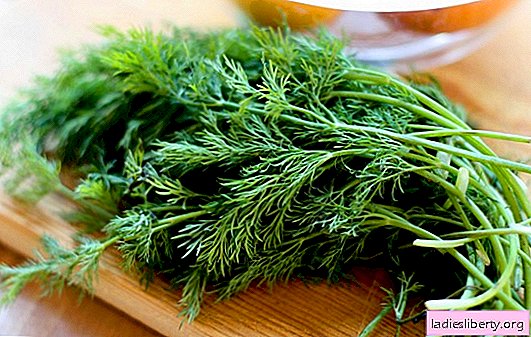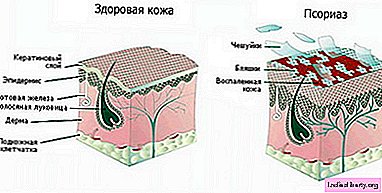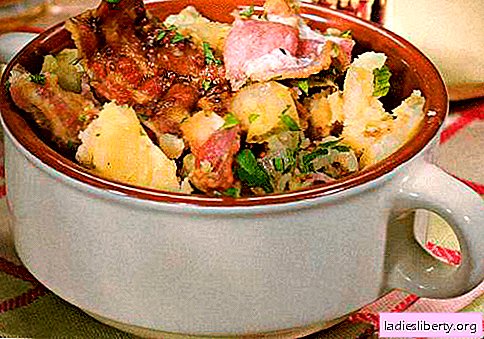
Dill is a unique perennial herb with a pleasant aniseed taste.
Its branches (leaves) and seeds are used as seasoning in various cuisines of the world.
Since ancient times, dill with the benefit of added to pickles, soups, and other dishes.
This is a great way to give flavor to a dish without a sharp increase in its caloric or fat content. And while many people use dill only as a taste enhancer in cooking, there are many other ways to benefit from dill.
Dill: composition, calorie
Dill is from the Mediterranean and East European regions. It requires a warm climate with well drained fertile soils. It grows up to 60 centimeters in height, thin twigs of dark green color with a rich spicy aroma and a sweetish aftertaste.
Dill seeds used as a spice are similar in taste and appearance to cumin - a light brown oval-shaped color with vertical ridges and a sweet-bitter aroma.
100 grams of low-calorie dill provides the daily need of the human body for:
• 257% vitamin A;
• 140% vitamin C;
• 82% iron;
• 55% manganese;
• 37.5% folate (vitamin B11);
• 23% riboflavin (vitamin B2);
• 21% calcium;
• 14% vitamin B6 (pyridoxine).
Dill herbs have every reason to be considered one of the most valuable foods. The calorie content of dill greenery is only 43 kcal per 100 grams, and the nutrients in it are not less than in any other, much more high-calorie, food, even in meat.
How to use dill
The use of dill as a medicine
As a medicine, sprigs of dill are famous for their antiseptic, digestive and carminative properties.
Dill essential oil, eugenol, is used for therapeutic purposes:
• as a local anesthetic and antiseptic;
• to reduce blood sugar in diabetics;
• to increase the secretion of breast milk in nursing mothers;
• to relieve neurological symptoms (headaches and nervous irritability).
Greens are used to relieve fatigue and swelling of the eyes:
If your eyes are just tired or swollen, mix 2 tablespoons of sour cream with 1 teaspoon of pounded dill (you can add parsley). Apply for 30 minutes on the eyelids and rinse with cool water. This cream has antiseptic, anti-aging and whitening properties.
Culinary use
Fresh dill should be thoroughly washed in water to remove sand and dirt, and to get rid of any residual pesticides. In order to preserve the flavor and taste of herbs, dill is usually added just before preparing recipes.
The use of dill from ancient times is used in the preparation of many popular dishes of the Mediterranean and European cuisine. Along with other spices, dill is used to enhance the flavor and taste of vegetables, chicken, fish and meat dishes.
Dill is used in soups, sauces, salads, pickles, and a wide variety of dishes.
Dill-based sauce recipe:
• 1/4 cup sour cream;
• 1 cup of mayonnaise;
• 1 tablespoon chopped parsley;
• a couple of drops of lemon essential oil and dill;
• 1 teaspoon Dijon mustard.
Mix everything well and serve fresh vegetable salad dressing.
Dill: what is the benefit for the body?
Dill greens are useful due to numerous chemical compounds in their composition, which have antioxidant, prophylactic and healing properties for the human body.
The benefits of vitamins and minerals in the composition of dill
Folic acid, riboflavin, niacin, vitamin A, beta-carotene, vitamin C, contribute to the optimal metabolism of the human body.
Vitamin A and beta carotene are natural flavonoids and antioxidants. 100 g of dill greens organism 257% of the daily recommended intake of this vitamin. Vitamin A is important for improving the condition of the mucous membranes and skin, and is important for maintaining visual acuity, protection against lung cancer and oral cavity.
Fresh dill is a source of vitamin C, the most common antioxidant. 100 g of the product contains about 85 mg or 140% vitamin C. Vitamin C helps the body develop resistance against infectious agents and eliminate harmful, pro-inflammatory free radicals.
A number of useful properties of dill are explained by the presence of minerals in it: calcium, potassium, copper, manganese, iron and magnesium. Copper plays a crucial role in the production of many vital enzymes, including cytochrome c-oxidase and superoxide dismutase (manganese and zinc play the role of other minerals as cofactors of this enzyme). Zinc also contributes to the production of many enzymes that regulate the synthesis of nucleic acids, the growth and development of the human body, and the digestive system. Potassium is an important component of cellular and other biological fluids, and helps control heart rate and blood pressure. Manganese affects the production of superoxide dismutase (an antioxidant enzyme).
The benefits of dill for the body: when the dill can be replaced with medicine?
Both seeds and dill have many useful properties that really help with the following conditions.
Bacterial infection
Dill herbs have long been helping people in the fight against bacterial diseases. Antibacterial beneficial properties of dill are used both externally and inward. In ancient times, burned dill seeds were used on open skin wounds to prevent infection.
Violation of the gastrointestinal tract
Dill contains substances that improve digestive function. The benefit of dill is to correct the level of gastric acid, which also helps to reduce the appearance of unpleasant breath and acid reflux. It also soothes an upset stomach, prevents diarrhea and reduces the amount of gas in the intestine. Dill seeds contain a volatile component, carvone, which reduces the formation of intestinal gases. In addition, dill contains fiber, necessary for the normal functioning of the gastrointestinal tract.
Hiccups
Dill is recognized as a traditional treatment for hiccups. If you throw a spoonful of fresh chopped dill into boiling water, cool and drink, you can certainly get rid of obsessive hiccups.
Headache
According to the principle of treatment, hiccups get rid of a headache - they brew fresh dill with boiling water, filter and drink like tea.
Stress and Emotion
Essential oils in the composition of dill have a calming effect on the body. To achieve maximum benefits for the body, dill is brewed with chamomile. The infusion calms and relaxes after a hard day's work or emotional stress.
To reduce stress and anxiety, mix the essential oils of dill, bergamot and lemon and use as aromatherapy.
Sleep disturbance
The soothing beneficial properties of dill also help in the fight against insomnia, it is used for sleep disorders since ancient times. Water infusion of dill drank or chewed the seeds, and in some cultures placed dill over the eyes and sleep came more quickly.
The optimal solution is a few drops of dill essential oil, added to herbal tea overnight.
Free radical protection
Fruits and vegetables of bright, saturated colors are useful for protecting the body from free radicals. Dill with its green color activates the destruction of free radicals. It helps prevent heart disease, cancer and many other problems.
Osteoporosis
Dill is one of the best plants sources of calcium. Regular consumption of dill prevents bone loss.
Other useful properties of dill
Greens and dill seeds are also useful for:
• lack of breast milk or its low quality;
• absence of menstruation and irregular menstruation;
• teeth brittleness (due to arginine strengthening occurs;
• low libido;
• fungal diseases (dill can replace chemical antifungal drugs).
Dill: what is the harm to health?
It should be said that dill is recommended not to everyone, and in some cases it is necessary to observe moderation. Damage to dill (in large quantities) is possible for people:
• with low blood pressure;
• predisposed to convulsive states;
• working in continuous production, height and with moving mechanisms (an excess of dill can cause drowsiness, dizziness and even fainting);
• with idiosyncrasy;
• pregnant women (large doses of dill can cause internal bleeding, which can adversely affect the course of pregnancy).
The rest can be safely advised to eat more dill without harm to health.
Dill for children: useful or harmful
Dill water is famous among mothers of babies up to two years old, since it is the easiest and safest way to rid a child of colic or gas. To make tea two teaspoons of crushed seeds pour a glass of boiling water, brew for 10 minutes. Adults can drink and concentrated solution, and children need to dilute it at least three times - the benefit of dill for children will be with a weak infusion.
For older children, herbalists recommend dripping two drops of dill and fennel essential oil into a piece of sugar and dissolve in the mouth. Start with one drop, gradually adding to the optimal dose. Apply up to three times a day.











